
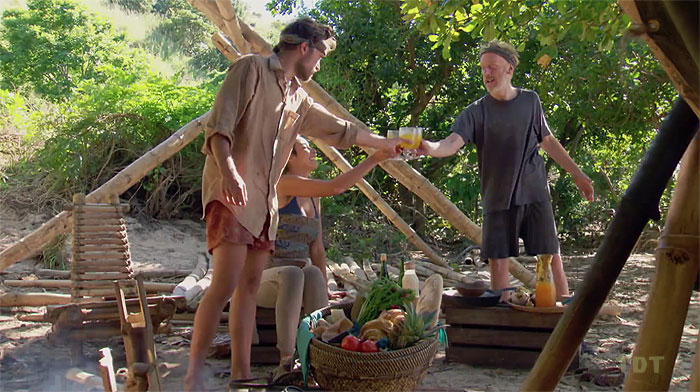
It's a bittersweet moment as we close the books on Survivor: David vs. Goliath, which coasted across the finish line, already having secured its spot among the top five all-newbie seasons the show has ever produced. Despite some early intrigue over whether Davie or Alison could pull off a miracle and reach the final four, the finale wasn't exactly tension-filled. Even so, as Ryan Kaiser points out in his recap, the entertainment value remained top-notch, mainly because the characters remaining were so compelling. In the end, the season-long David vs. Goliath story played out exactly as the winner personally foreshadowed in the premiere, with a David becoming the king.
All in all, a hugely successfully season for the show, which is an accomplishment in itself as Survivor nears the end of its second decade. Perhaps more than anything else, the most crucial ingredient was the cast. Survivor often has to choose between big characters and big gameplay. David vs. Goliath provided a wide assortment of contestants who filled both roles, and was lucky in that many of them lasted late into the game. Maybe that luxury helped free the show up to more playfully tell the story of the season. Jeff Probst told Josh Wigler that a big change from the post-production side was "leaning into our sense of humor."
That's been one of the most welcome, noticeable changes. In a 20-player season, Survivor is a tragedy for 19 of those players. Survivor would seem pretty dark without some moments of light-hearted fun, and this season was full of them, from jacket debates, to Brochacho/Slamtown organizational affairs, to rice negotations, to most of Christian's time on the screen. Not to mention some spectacular strategic moves, in which John and Dan joined the jury in back-to-back episodes of numbers-evening advantages, idols, and savvy vote splitting.
This was the season where everything just worked. Even aspects that have previously seemed grating — constant repetition of the theme, long stretches of nothing but balance/endurance immunity challenges, final four firemaking — were minor afterthoughts in the context of fun, compelling characters and elevated gameplay. Ryan highlighted the contributions of Angelina and Mike, but people like Davie also really helped keep the season afloat. Davie's irrepressible joy just to be playing was always fun to see, and his refrain after each vote of respecting each other, and that it's only a game, might have been a difference-maker. That's the kind of attitude that helps soothe hurt feelings, and keeps the game fluid. It helps that he also pulled off the biggest idol play of the season. It's a bummer that, like Christian and Gabby, Davie fell just short of the finals, but dear Survivor: Please cast more energetic, positive, active players like Davie. Thanks. Or just find some way to clone this entire cast each season. Either way.
Emerging trends in Survivor jury votes
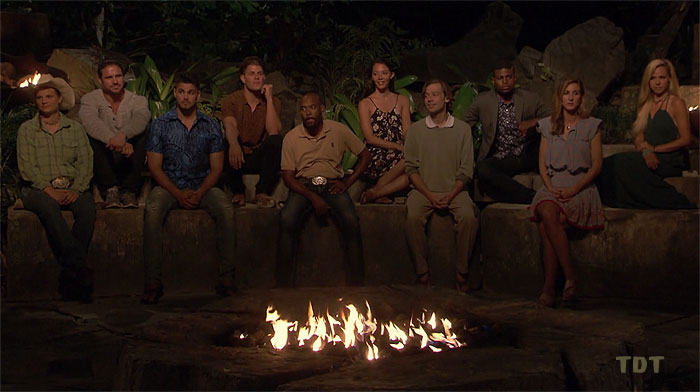
With only three instances, it's still too early to assess how much the Final Four firemaking has changed the game, apart from the obvious observation that it forces the contestants to start eliminating threats one vote earlier. Nick praised the twist in his exit interviews, and now that someone other than the person who won at firemaking has finally won the game, maybe we'll allow that it might have benefits for the audience: It at least injects some unpredictability into the makeup of the Final Three. Gone are the days when a Boston Rob can just bank on a solid three-person alliance of himself plus two goats guaranteeing him the million. That's something, at least. (At least until the next Boston Rob just surrounds himself with three goats.)
There are, however, a couple of interesting trends in how juries vote that are now becoming apparent, one of which predates the F4 firemaking, and one of which roughly coincides with it.
Idol worship: The first has been evident for a while: Including Tyson's win that season, every winner since Blood vs. Water has played an idol (or a Legacy Advantage acting as an idol) at Tribal Council. (The one exception, Michele Fitzgerald, had an entire special Tribal Council dedicated to her playing an advantage she'd won, that allowed her to remove a juror. Close. Enough.) Tony Vlachos wielded a super idol. Natalie Anderson blindsided Baylor by playing her idol for Jaclyn. Mike Holloway, Jeremy Collins, Sarah Lacina, and Ben Driebergen all saved themselves with idol plays.
We are now truly in the era of Big Moves, and juries have rewarded those moves consistently for 11 straight seasons. Christian's praise for Mike White's subtle, transformative social game notwithstanding, it looks really difficult for a non-Big Move-r to win right now.
Nick Wilson extends that streak of winners in style. Even though his own idol play was a bit of a bust, he at least took partial credit for the split minority vote in support of Davie's idoling out of John, and he co-engineered (with Carl) the vote steal/ idol nullifier combination that blindsided Dan. Those were huge plays that left a lasting impression on two key early jurors. Nick and Mike both had alliances and relationships forged with lots of people individually, and to that degree, they played similar games. Nick's advantage and idol plays then probably gave him the edge (as did being an original David).
So what will it take for someone who hasn't pulled off a Big Move to win the game again? Apart from choosing final three companions where nobody played an idol or advantage, it's hard to say what that game would look like. But we'll be excited to see it when it does.
Juror voting blocs: The other, more recent trend in jury votes: Clear splits between early- and late-jury votes. Just look back at the last three (perhaps four) seasons, which followed a string of unanimous or nearly unanimous jury votes:
- S37: David vs. Goliath - First six jurors all voted Nick; three of the last four voted for Mike.
- S36: Ghost Island - First five all voted Domenick; last five all voted Wendell (as did actual last voter Laurel).
- S35: Heroes v. Healers v. Hustlers - First five all voted Ben, the next two Chrissy, final juror (Devon) voted for Ryan.
- S34: Game Changers - Three of the first five voted for Brad; last five all voted Sarah .
Game Changers doesn't *quite* fit the trend of the other three. In the most recent seasons, the first five jurors have voted the same way every time (in fact, the first six did this season — although Gabby, the sixth, was clearly torn about her vote). In Game Changers, it was the late jurors who all voted together. This is really something we haven't seen before — Gabon and South Pacific both had early/late juror preference splits, but those were more based on original tribe loyalty. So what's changed?
It's possible that the Nick/Mike split is really one between Big Moves and social game, with the early jurors favoring Nick's Tribal fireworks displays. That same split easily carries over to early jurors appreciating Dom's theatrics in Ghost Island, and all the Ben Bombs in HvHvH. Wendell played more low-key, building strong social bonds game than Dom. Chrissy won immunities and surrounded herself with like-minded social/strategic players in her chosen final three (only to be thwarted by the F4 firemaking twist). Game Changers is the outlier here, with Sarah's aggressive, advantage-laden gameplay winning late jury (instead of early jury) favor, in contrast with Brad's more traditional alliances/immunity wins combo.
So it's not clear that early jurors always prefer the people who entertain them the most during jury duty. Maybe it's something else. There's one other thing (apart from F4 firemaking) that's also changed recently: the larger jury size (10, which started in S33: MvGX). That could well play a more causative role: These recent seasons also had large juries and long post-merges. S35 merged on Day 17, S36 on Day 20, S37 on Day 18. In the odd-numbered seasons, that meant there were three full weeks of game between the merge and the Final Tribal. During that time, the game changed quite a bit, in both seasons.
Based on the exit interviews, the early jurors mostly voted for Nick because they were first-hand witnesses (as John pointed out during Final Tribal) to Nick's biggest moves. The later jurors, in contrast, were privy to Mike's more subtle, socially powerful game (and more separated from Nick's), and voted for Mike because of that. Nick arguably controlled the early post-merge, Mike the end game. So everyone more or less voted for the person who was running the game when they were last in it.
That also fits the HvHvH and Ghost Island juries. Ben was viewed as the leader of the Heroes/Hustlers alliance at the merge (with Joe referring to him disparagingly as "King Arthur"). Clearly, Ben was later on the outs, and Chrissy rose in prominence, shaping the endgame alliance. In Ghost Island, when Domenick banished his arch-rival Chris Noble as the first juror, it could well have been inferred that Dom was now the leader of the dominant Naviti (Strong) alliance. Wendell was making the same moves, just was ever-so-slightly better liked. And it was more or less the same back in Game Changers: Brad and his alliance controlled the early post-merge, but Sarah ended up working against him as he fell from favor with the likes of Cirie, Tai, and Aubry.
As future players learn to navigate these more complex post-merges, the lessons will likely become more clear. Certainly, however, impressing jurors is no longer a one-size-fits-all task. It's more, as Mike told his wine glass at the reward feast, "Like a job, always I have to be doing something."
The role of luck in winning Survivor (seasons)

Every Survivor winner (the more gracious, humble ones at least) acknowledge the outsized role that luck plays in their victory. A stray vote here or there, or a missed idol/immunity, and you'll often end up with a different winner. That same principle also applies to Survivor seasons: As great as this cast was, it wasn't all that much better (on paper) than the two that preceded it.
Ghost Island's cast was saddled with a clunky game mechanic that also forced the editors to constantly reference the "Survivor gods." This became increasingly tiresome over time (roughly around the second episode). The trips to the island itself yanked someone away from the game for too long, for a consolation prize that was at best underpowered. On the rare occasions where advantages were even available for winning (and then, not without risk), they were relatively useless once acquired. (Oh yay, an extra vote, or a challenge do-over ... wheeeee.) Meanwhile, the people not sent to Ghost Island were digging up glorious Survivor historical relic idols back in camp, left and right.
Not only did the theme overpower the contestants, but Ghost Island saw one tribe get decimated early, taking out a good number of big characters and players before the merge, and leaving the rest scrambling for a faint glimmer of hope. In between pointless exile trips. In contrast, the David vs. Goliath theme, while a bit wearying to hear Probst still trying to pound it home in, say, Episode 12, was less smothering. The contestants were more free to run with it to the extent they saw fit. The theme didn't kidnap anyone for one to two days, at least.
While this cast had a lot of standouts, so did Ghost Island, we just got lucky here that a lot of the chief [Original Tribe] STRONG adherents (the first four jurors) were voted out early enough that tribal lines were free to blur, eventually. Also that the minority group was able to force the issue, because they found a bunch of idols and advantages. Malolo tried this, but they just didn't have enough numbers or firepower. Had a few people like Jacob, James, Stephanie, or Brendan reached the merge, and some of the less-active players like Angela, Sebastian, Jenna, or Chelsea taken the pre-jury trip, we might have enjoyed a much more dynamic endgame. Maybe even if someone like Chris Noble had just lasted a few more rounds and created some additional chaos. It only would have taken one or two more strong players to tip the balance, and GI might have had just as fluid a post-merge as this season.
Heroes v. Healers v. Hustlers also had a strong, interesting cast (and things like that). Fans tend to forget that, because Ben's idol-strewn end run — combined with the surprise springing of the F4 firemaking twist — soured people on the final few episodes, because it gave the appearance that production was rigging the season for Ben to win. (Much of which could have been avoided by just announcing the F4 firemaking before the season started filming ... you know, telling the players the rules of the game before they play it? What a concept!) But here boot luck also played a factor: swap out someone like Ali with JP, and the post-merge ratchets up a notch.
Really, had just a few votes gone a different way in S35 and S36, we might be talking about how we're now smack in the middle of Survivor's Golden Age, and also wondering why production shot themselves in the foot with a too-soon returnee-flogging season as half-baked as Game Changers.
No doubt Survivor's production team is also asking themselves what was special about this season. The answer is simple: The cast really was really good. That and luck. It wasn't because America especially loves Bible stories, like David vs. Goliath. It wasn't because everyone could have died in two cyclones during the first week of filming. It wasn't because of the idol nullifier. Just good people playing the game, and good fortune. That's all you need.
New twists from foreign sources
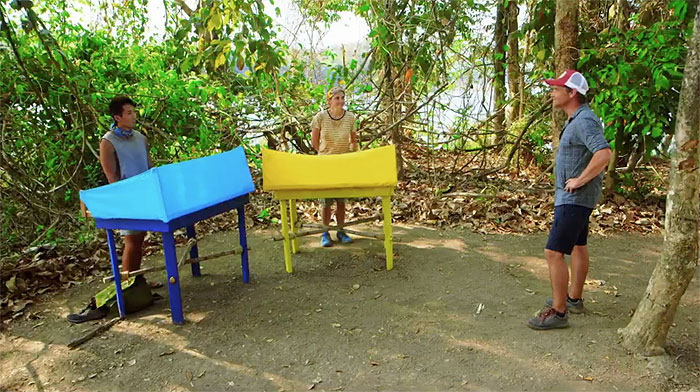
We really are in the Golden Age of Survivor, though, as 2018 has been a banner year for international Survivor versions, in addition to the success of David vs. Goliath.
While David vs. Goliath was great, it's always a good idea to have a twist or teed up, just in case — perhaps to liven up a future season that didn't quite go as planned, and saw some of the best characters/players leave in the pre-merge. Alternatively, given that U.S. Survivor is in perpetual need of new themes twice a year, here are a couple of twists used elsewhere this year, ones that really stand out as game elements the U.S. show should scoop up and get ready to deploy. (Given that two challenges from Australian Survivor made their way into this season, that's not as outlandish a suggestion as it might seem.) As Debbie would say, "The bomb doors are open!":
The Outpost (above): This was used in the pre-merge portion of Survivor NZ: Thailand. (See our in-season praise of it here.) There's not much to it set-wise, just a couple of tables, upon which a small-scale duel or dilemma takes place. But that's not the point. The Outpost hands out a constantly changing set of rewards or advantages, and it's up to the participants themselves to decide how much — or how little — of their experience they want to tell their tribe about. It's basically Ghost Island, but done with two people, not one. (Oh, and unlike Ghost Island, there's never a "No game for you" misfire, and something always happens.)
The fun starts when people lie: because the reward is different, it's hard to tell when the Outpost visitor is telling the truth. Keeping in mind that if a contestant does decide to lie, there is always one other witness to what happened, and a swap could happen at any time. There's also the possibility for information exchanging and cross-tribal alliance-making, all in complete secret. The more adept Survivor NZ players also gamed the attendance system, rigging their straw-drawing to ensure their allies got to go, and blocking out the people they didn't want to have access to an advantage. A lot of on-the-spot gamesmanship grew from a pretty humble game element. Given that U.S. Survivor avoids separate reward challenges early in the season, this could easily fit in the first few episodes of the season. It doesn't take up much time, but the payoff is more than worth the minimal investment. Bonus: More screentime for Probst!
Re-casting the auction as the merge feast: This is an Australian Survivor repurposing of a now-abandoned U.S. game element, and it paid off in interesting ways in Champions vs. Contenders. The two best surprises were ones that would also work well in the U.S. version.
- First, an early covered item immediately ejected the unlucky bidder from the auction, Will Sims-style. Except ... they were then forced to go sit at the "beggar's table," where they could bat their eyes, longingly, at every person who wins food. Olympic swimming star Shane Gould, the oldest player in the game, ended up the beggar, and she made a killing from jokingly bemoaning that she was a poor, feeble old lady. It made the proceedings feel a lot more fun than, say, the Worlds Apart rage-fest.
- Secondly, the auction's food items ended up being a great way to distribute advantages on the sly. Shonee Fairfax bid on and won a seemingly ridiculous item — a giant jar of candy — that turned out to have a vote steal advantage buried amidst the sugar. U.S. Survivor has rightly worried that the auction has been broken, because the superfans have learned to just hold out on the actual auction, waiting to bid their entire stack of cash on the one advantage that comes up towards the end. Not having any advantage directly available for bidding fixes that, and having the auction replace the merge feast also gives extra incentive to actually bid. Not to mention that sneaking the advantage into what looks like an innocuous food item is a hilarious trick to play on the money-hoarders waiting for the advantage to be put up for bid.
Do early merges increase (attempted) Pagongings?
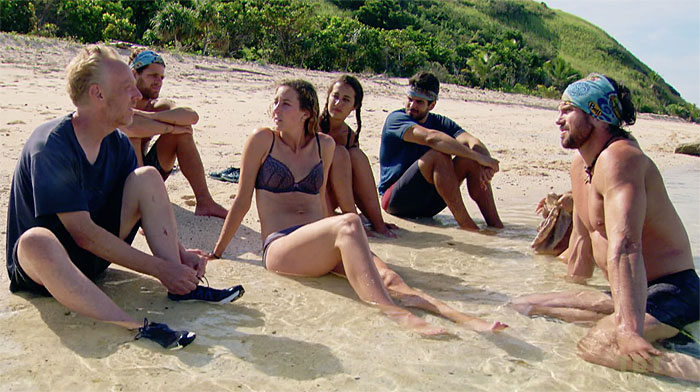
Getting back to U.S. Survivor, the other recent development, especially in 20-player seasons, is hitting the merge with 13 players (12 in an 18-player season). That's a lot! In theory, this should be a good thing. More players equals more opportunities for someone on the bottom to shake things up, and topple and entrenched majority, right? Right?
In practice, no, that doesn't always happen. Instead, despite all the changes in the game over its history, the more likely outcome is one seen in the very first season, when just nine people reached the jury phase: The dreaded Pagonging, where a dominant alliance slowly picks off their minority alliance opponents. In the 20-player season era, large, seven-plus person majority alliances have control at the merge, and there's a strong disincentive for any of them to rock the boat early on.
This makes intuitive sense: With so many people around, sticking to original tribal lines is a simple way to hit pause for a few boot cycles. You can't possibly form six (or more) new Final Two alliances in a 2- to 3-day span, so having a few easy post-merge votes gives the majority alliance some breathing room to re-evaluate how they want the end-game to play out, and to forge new relationships, if need be.
The past three seasons back that up: We saw an early post-merge Pagonging start in HvHvH, where the Heroes and Hustlers joined up to eat away at the superior Healers' numbers (much as Beauty and Brawn did in Kaoh Rong). We saw it in Ghost Island with Naviti Strong, we saw it this season with the Goliaths, at least until the Davids started unleashing their arsenal of advantages. It doesn't seem to matter if there are two or three original tribes, the original tribe imprint is really strong, and those divisions provide an easy strategic fallback.
Whether or not the larger merge simply creates too much chaos (the sample size of 13-player merge seasons is small enough that there's no particularly solid statistical argument either way), there may be a way to reduce the incentive to Pagong. We were lucky this season: Both original tribes had a lot of active players left at the merge, and the outnumbered Davids had the tools through which to flip a couple of early post-merge votes. That won't happen every season, though, so are there structural tweaks that could be made to avoid Pagongings?
Maybe. Here are two simple options worth trying, simply by dusting off an old twist (and another that's never been used):
The four tribes option: Survivor has started with four tribes just twice, first in S12: Panama-Exile Island, then, highly cringe-inducingly, in S13: Cook Islands. That was twelve long years ago. We didn't even have modern immunity idols then! Taking away the ill-advised racial division from Cook Islands, though, four tribes really could shake things up, just enough such that we could consistently see a less Pagonging-prone post-merge. Simply start the season with four tribes of five, drop down to three tribes (of six) with 18 players left, then again to two tribes at 16 (or 15) left, then merge at 13. With small original tribes and multiple swaps, there's really no incentive for the tiny original groups of people left at the merge to stick together forever. Four tribes also eliminates the recent common problem with three tribe seasons: Two tribes ganging up on the third at the merge. Four tribes
The no tribes option: We've suggested this before, but basically it's One World, except random (or schoolyard-picked) teams are drawn before each challenge, or at worst, once an episode (a.k.a., Pirate Master rules). With no tribes, there's no initial tribe loyalty. You can't have Naviti Strong or Goliath Strong if you don't have a Naviti or a Goliath! The downside here is that constant schoolyard picks strongly disfavors people who aren't great in challenges. Still, that could be an incentive for the challenge production team to keep emphasizing a mix of different skills in each challenge. Or maybe have all brute strength in one, followed by all puzzles in the next. Worth a shot?
Numbers addendum: Christian's vote-magnet status, in a table
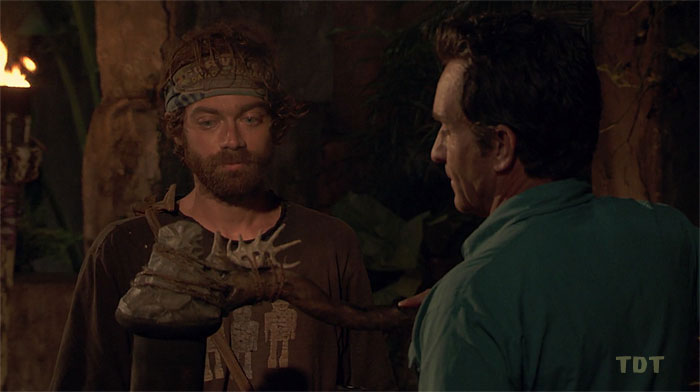
As a follow-up to Christian's claim of receiving the most votes against in a single season while being voted out once, we re-calculated our VAP (votes against player) stats as both the actual total (VAPa), which would be just votes that counted, and the "intended" total (VAPi), which includes votes that were erased by idol plays or Legacy Advantages. Below are the Top 10 single-season VAPi totals. Well, it would have been Top 10, but we noticed that we could include Jonathan Penner twice if we just extended it to Top 13 (baby!), and why wouldn't you want to have twice as much Penner?
The results? Christian is correct: He's tied with Jenn Brown from Worlds Apart — both were voted out once, both saw their names come up on votes 18 times. That's a big number! We sorted by VAPi, then by fewest times voted out, hence the non-ties for the people who saw their names 17 times. It's interesting that all but one of these performances (Penner in Cook Islands) have come post-Heroes vs. Villains. Apparently part of the modern Survivor experience is being voted against more.
| Rank | Contestant | Season | VAPa | VAPi | Times voted out |
|---|---|---|---|---|---|
| 1 | Laura Morett | S27: Blood vs. Water | 19 | 19 | 2 |
| 2-t | Jenn Brown | S30: Worlds Apart | 11 | 18 | 1 |
| 2-t | Christian Hubicki | S37: David vs. Goliath | 6 | 18 | 1 |
| 4 | Phillip Sheppard | S22: Redemption Island | 17 | 17 | 0 |
| 5 | Kelley Wentworth | S31: Cambodia | 5 | 17 | 1 |
| 6 | Ozzy Lusth | S23: South Pacific | 17 | 17 | 3 |
| 7-t | Eddie Fox | S26: Caramoan | 12 | 16 | 1 |
| 7-t | Keith Nale | S29: San Juan del Sur | 13 | 16 | 1 |
| 7-t | Baylor Wilson | S29: San Juan del Sur | 16 | 16 | 1 |
| 10-t | Jonathan Penner | S13: Cook Islands | 15 | 15 | 1 |
| 10-t | Edna Ma | S23: South Pacific | 15 | 15 | 1 |
| 10-t | Sierra Dawn Thomas | S34: Game Changers | 9 | 15 | 1 |
| 13-t | Marty Piombo | S21: Nicaragua | 14 | 14 | 1 |
| 13-t | Jonathan Penner | S25: Philippines | 7 | 14 | 1 |
| 13-t | Abi-Maria Gomes | S31: Cambodia | 14 | 14 | 1 |
| 13-t | Andrea Boehlke | S34: Game Changers | 14 | 14 | 1 |
Shorter, more finale-focused takes
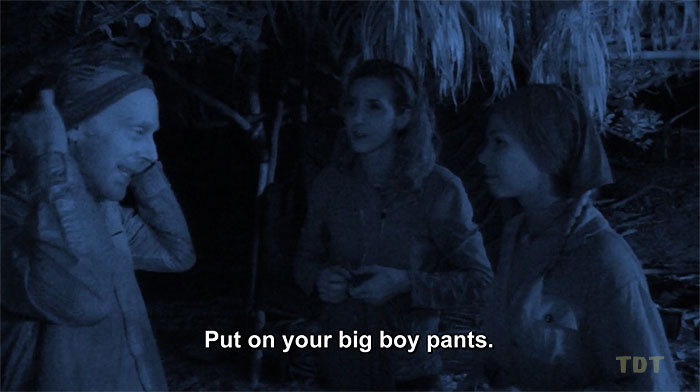
- A strategic tantrum? When Davie was blindsided, Nick told Davie he hadn't voted for him, and Davie kind of brushed him off ("Of course you didn't, Nick"). But by throwing a fit when the Kalokalos got back at camp, Nick created a moment that was then re-visited at the next Tribal Council, where everyone agreed that Nick had been really mad about Davie being gone. It seemed like a really bad look for Nick in the moment, with everyone talking about him being a "child" and needing to "put on [his] big boy pants," but it served a critical jury-management purpose, without the jury even being present: Getting the message over to Davie that Nick had indeed been out of the loop on that vote. It's not at all clear that this was by design, but future players should definitely consider doing this, nonetheless.
- A day late and a million dollars short: It was hard not to notice that after a long, excruciating stretch of endurance- or balance-related challenges, a challenge featuring not one but two puzzles popped up on Day 36 ... the day after Christian was voted out, on Day 35. Oh, and then another puzzle appeared on Day 37. Thank goodness those weren't spread out even a teensy bit more, giving a certain fan-favorite vote-magnet a fighting chance. (Of course, if the F6 IC had come at F7, fans would then have howled that production was "rigging the game" to save Christian, just as they turned on Ben Driebergen.)
- Kara's record setting non-vote-out: Kara lost at fire-making and joined the jury on Night 38. That's the latest anyone has left the game without ever being voted against. The rest of the top 3: 2. Paschal English in Marquesas (rocks, Day 37); 3. Cirie Fields, Game Changers (Advantage-geddon, Day 36). The rest are a bunch of people who either quit or were medically removed.
 Jeff
Pitman is the founder of the True Dork Times,
and probably should find better things to write about than
Survivor. So far he hasn't, though. He's also responsible
for the Survivometer, calendar, boxscores, and contestant
pages, so if you want to complain about those, do so in
the comments, or on twitter: @truedorktimes
Jeff
Pitman is the founder of the True Dork Times,
and probably should find better things to write about than
Survivor. So far he hasn't, though. He's also responsible
for the Survivometer, calendar, boxscores, and contestant
pages, so if you want to complain about those, do so in
the comments, or on twitter: @truedorktimes
Other David vs. Goliath Episode 14 recaps and analysis
- Gordon Holmes at XfinityTV.com: "The Rock and Rice Connection?"
- Dalton Ross at EW.com: "A champion is crowned"
- Dalton Ross & Jeff Probst at EW.com: Q&A
- Hannah Shapiro & Erik Reichenbach at People.com: "Survivor: David vs. Goliath Crowns Nick Wilson as Winner"
- Andy Dehnart at Reality Blurred: "Survivor ends an exceptional season with a strong finale"
Exit interviews - Nick Wilson (Winner)
- Gordon Holmes at XfinityTV.com (12/20/18): "Nick - 'Nobody Knew I Was a Lawyer Until the Day After Final Tribal'"
- Dalton Ross at EW.com (12/20/18): "Nick on what we didn't see in the finale"
- Mike Bloom at Parade.com (12/20/18): "Nick Wilson Gets the Winning Verdict"
- Rob Cesternino at RHAP (12/20/18): "Exit Interviews | Final Six from David vs. Goliath - 12/20/18"
- Josh Wigler at The Hollywood Reporter (12/20/18): "Survivor: David vs. Goliath Walks Through the Path to Victory"
Exit interviews - Mike White (2nd place)
- Gordon Holmes at XfinityTV.com (12/20/18): "Runner-Up Mike - 'I Think If I Won, America Would Have Come to My House and Killed Me"
- Dalton Ross at EW.com (12/20/18): "Mike White says he 'wussed out' at final Tribal Council"
- Mike Bloom at Parade.com (12/20/18): "Mike White Pitches the Script of His Survivor Story"
- Rob Cesternino at RHAP (12/20/18): "Exit Interviews | Final Six from David vs. Goliath - 12/20/18"
- Josh Wigler at The Hollywood Reporter (12/20/18): ""
Exit interviews - Angelina Keeley (3rd place)
- Gordon Holmes at XfinityTV.com (12/20/18): "Runner-Up Angelina and Castaway Kara on How the Show Can Better Portray Women"
- Dalton Ross at EW.com (12/20/18): "Angelina defends her fake idol trick on Alison"
- Mike Bloom at Parade.com (12/20/18): "Angelina Keeley and Kara Kay on Alpha Males and Idol Fails"
- Rob Cesternino at RHAP (12/20/18): "Exit Interviews | Final Six from David vs. Goliath - 12/20/18"
- Josh Wigler at The Hollywood Reporter (12/20/18): ""
Exit interviews - Kara Kay (4th place)
- Gordon Holmes at XfinityTV.com (12/20/18): "Runner-Up Angelina and Castaway Kara on How the Show Can Better Portray Women"
- Dalton Ross at EW.com (12/20/18): "Kara on what went wrong with the fire-making"
- Mike Bloom at Parade.com (12/20/18): "Angelina Keeley and Kara Kay on Alpha Males and Idol Fails"
- Rob Cesternino at RHAP (12/20/18): "Exit Interviews | Final Six from David vs. Goliath - 12/20/18"
- Josh Wigler at The Hollywood Reporter (12/20/18): ""
Exit interviews - Alison Raybould (5th place)
- Gordon Holmes at XfinityTV.com (12/20/18): "Alison and Davie on Fake Idols, Dragon Ball Z, and the Importance of a Good Season"
- Dalton Ross at EW.com (12/20/18): "Alison reacts to Angelina's fake idol trick"
- Mike Bloom at Parade.com (12/20/18): "Alison Raybould and Davie Rickenbacker on the Brain and the 'Blerd'"
- Rob Cesternino at RHAP (12/20/18): "Exit Interviews | Final Six from David vs. Goliath - 12/20/18"
- Josh Wigler at The Hollywood Reporter (12/20/18): ""
Exit interviews - Davie Rickenbacker (6th place)
- Gordon Holmes at XfinityTV.com (12/20/18): "Alison and Davie on Fake Idols, Dragon Ball Z, and the Importance of a Good Season"
- Dalton Ross at EW.com (12/20/18): "Davie reveals hidden meaning behind Tribal Council speech"
- Mike Bloom at Parade.com (12/20/18): "Alison Raybould and Davie Rickenbacker on the Brain and the 'Blerd'"
- Rob Cesternino at RHAP (12/20/18): "Exit Interviews | Final Six from David vs. Goliath - 12/20/18"
- Josh Wigler at The Hollywood Reporter (12/20/18): ""
Podcasts
- Rob Cesternino at RHAP: "Know-It-Alls | David vs. Goliath Finale Recap | Domenick Abbate & Chrissy Hofbeck"
- Rob Cesternino at RHAP: "Bret LaBelle & Tyler Fredrickson Recap the FINALE of Survivor: David vs. Goliath"
- Andy, John, Emma & Matt at The Purple Rock Podcast: "With Great Power Comes Great Responsibility"
- Dom Harvey & Colin Stone at The Dom & Colin Podcast: " -- Episode 14 Recap/Analysis"
ADVERTISEMENT